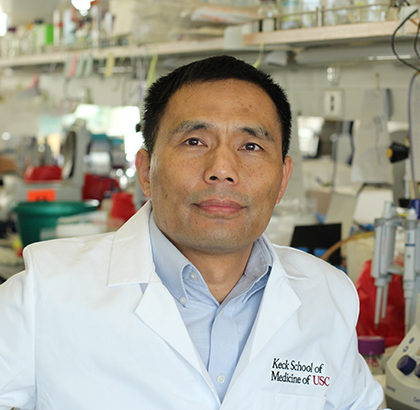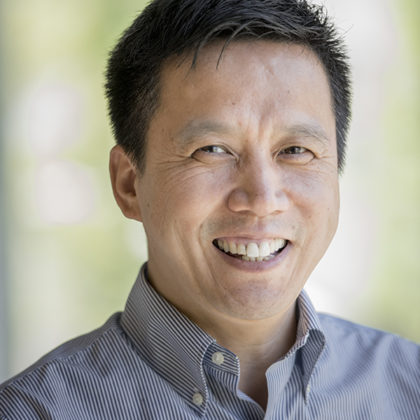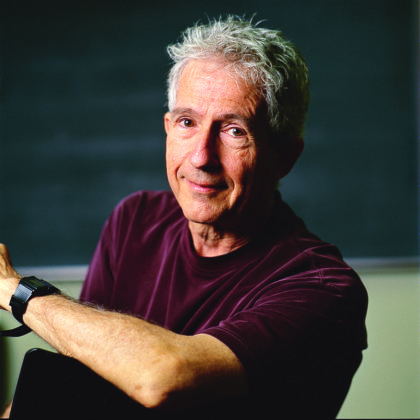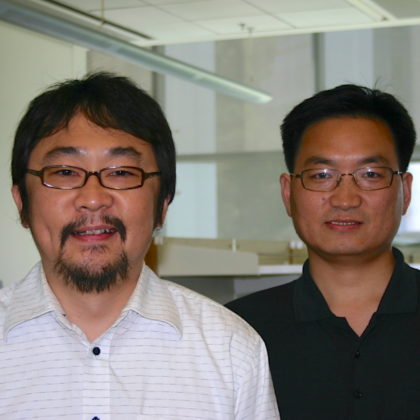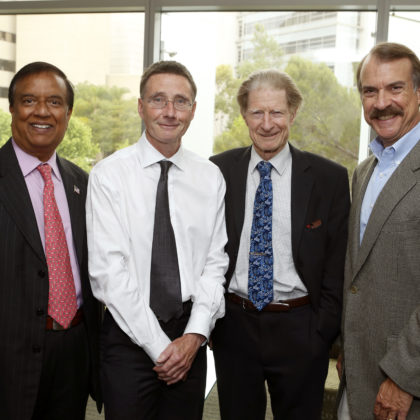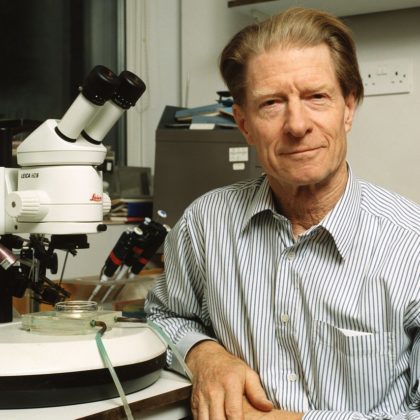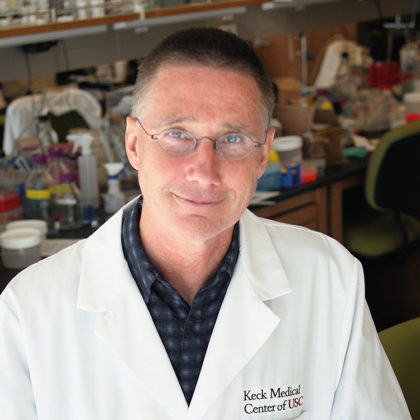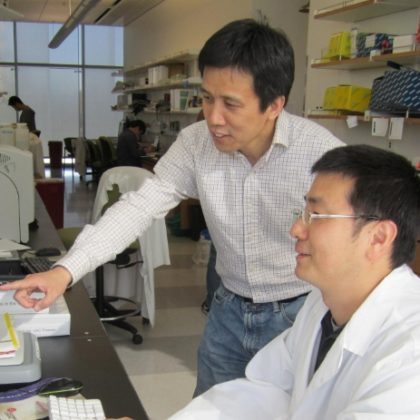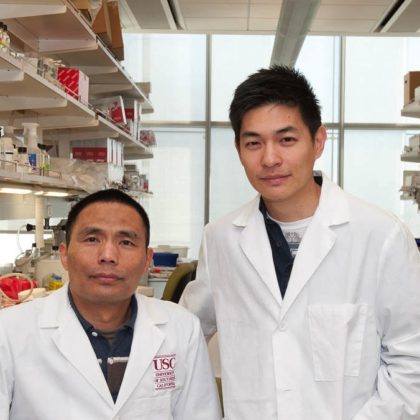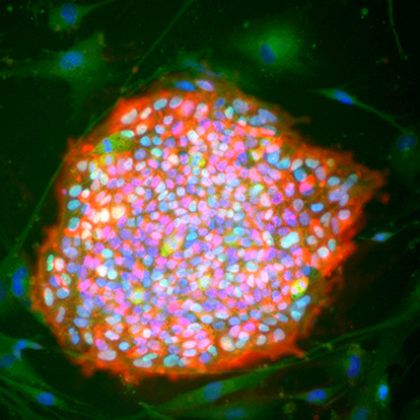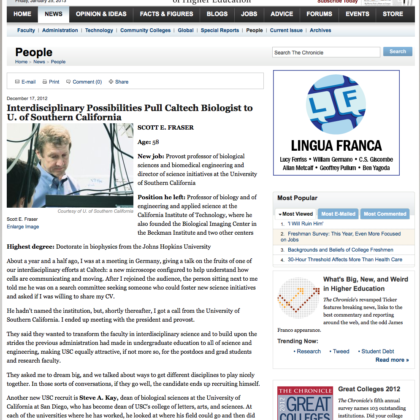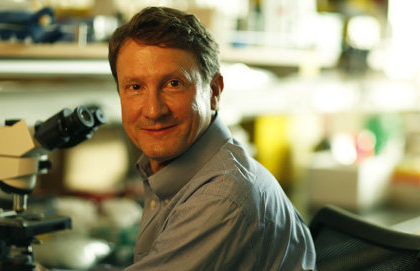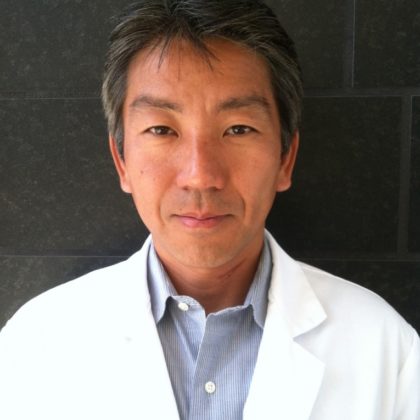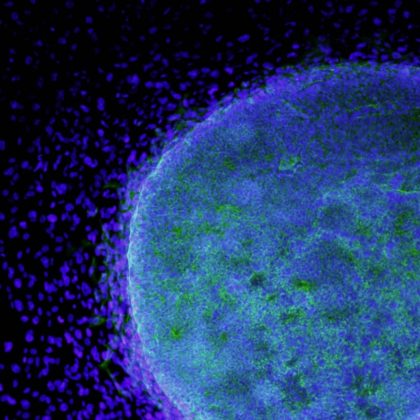A genetic catch-22 promotes and prevents liver cancer
Can the same gene prevent and promote cancer? When it comes to liver cancer, the gene that codes for P53, a protein found in humans and many other animals, involves this catch-22. …
USC study sheds light on stem cell reprogramming
Researchers are learning how to turn regular cells into stem cells, a process called reprogramming. However, some of the mechanisms of the process remain unknown, such as why only a small proportion of the cells can be reprogrammed. Researchers have at least part of the answer: the structure of genes.
Common genetic disease linked to father’s age
Scientists at USC have unlocked the mystery of why new cases of the genetic disease Noonan syndrome are so common—a mutation, which causes the disease, disproportionately increases a normal father’s production of …
New study identifies the cellular origin of liver fibrosis
Fibrosis is the process of scar tissue formation. Liver fibrosis can be caused by injury to the liver, chronic viral infection and alcohol abuse. Advanced liver fibrosis can lead to cirrhosis, portal …
Interview with Sir John Gurdon
Sir John Gurdon, a Nobel Prize-winning biologist whose experiments in the field of cloning laid the foundation for modern stem cell research, visited the USC Health Sciences Campus on May 16. He …
Nobel Laureate discusses history of cloning
Cells can be stubborn things. A skin cell resists changing into a liver cell, and a heart cell wants to remain a heart cell. But with the right kind of manipulation, they …
Nobel laureate to speak on stem cells at HSC
Nobel laureate Sir John Gurdon will speak on “From Nuclear Transplantation to Prospects for Cell Replacement” on May 16 at noon in the Aresty Auditorium of the Harlyne J. Norris Cancer Research …
Probing the power of stem cells
Piece by missing piece, scientists at the Keck School of Medicine of USC are deciphering the powerful gene regulatory circuit that maintains and controls the potential of embryonic stem cells (ESCs) to …
Unraveling the mystery of pluripotency in embryonic stem cells
Using advanced sequencing technology, USC Stem Cell faculty member Wange Lu, in collaboration with Kai Wang of the USC Zilkha Neurogenetics Institute, explores the mystery of pluripotency by mapping out the interaction …
McMahon discusses central role of stem cell biology in medicine of the future
USC scored a major coup when it brought scientist Andrew McMahon to the Keck School of Medicine of USC from Harvard University, where he had served for almost two decades as a …
An important factor identified in reprogramming
How is the stem cell state programmed? A new study in Qi-Long Ying’s group at the Eli and Edythe Broad Center for Regenerative Medicine and Stem Cell Research at USC highlights the role …
USC launches Regenerative Medicine and Stem Cell Research Initiative
A new USC initiative has been introduced to support collaborative research in regenerative medicine and stem cell biology across the university, facilitating the critical move from basic research into clinical applications.
Chronicle of Higher Education features Scott Fraser
The Chronicle of Higher Education featured Scott Fraser, Provost Professor of Biological Sciences and Biomedical Engineering and the Director of Science Initiatives at USC, who arrived this year from the California Institute …
Scott Fraser named Provost Professor at USC
Elizabeth Garrett, USC provost and senior vice president for academic affairs, has announced the appointment of Scott Fraser as Provost Professor of Biological Sciences and Biomedical Engineering and the Director of Science …
Andrew McMahon installed as chair of stem cell biology at Keck School of Medicine of USC
Andrew P. McMahon, newly appointed department chair of stem cell biology and regenerative medicine at the Keck School of Medicine of USC and director of the Eli and Edythe Broad Center for …
$1.75 million grant to engineer transplantable liver cells from discarded human placenta
Stem cell researchers at USC have received a $1.75 million grant to engineer transplantable liver cells from discarded human placenta, a potential cure for certain congenital metabolic disorders. If successful, the proposed …
Harvard scientist recruited to lead USC’s center for stem cell research and regenerative medicine
The University of Southern California announces a major scientific recruitment to the Keck School of Medicine, one that will have a transformative effect on the medical and biological sciences across the university’s …
USC scientists find mechanism that allows for reprogramming stem cells
In healthy bodies, liver cells beget liver cells, while skin cells beget skin cells. Previous research, however, has shown that—sometimes—cells can be reprogrammed, from skin, for example, to muscle or vice versa. …
USC research listed among top breakthroughs of 2010
Groundbreaking research by Keck School of Medicine of USC researchers has been selected as one of Science magazine’s top 10 Breakthroughs of 2010. The study, Production of p53 gene knockout rats by …
USC researchers create first “knockout” rats using embryonic stem cell technology
Researchers at the Keck School of Medicine of the University of Southern California (USC) have, for the first time, generated “knockout” rats—animals that are genetically modified to lack one or more genes—through …
